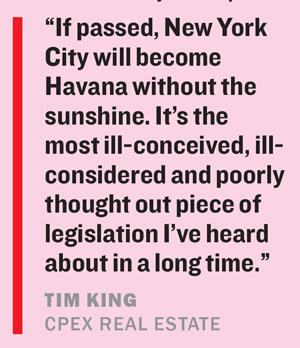Don’t fret if you missed the City Council’s roughly eight-hour hearing on the so-called commercial rent control bill. The upshot is that the real estate industry doesn’t like it.
The controversial legislation — officially known as the Small Business Jobs Survival Act — aims to alleviate widespread retail closures and vacancies. It would do so by granting retail tenants 10-year lease renewals at their existing rents as long as they meet the terms of their current contracts.
Related: NYC’s top retail brokerages
According to the city’s Department of Small Business Services, the average storefront vacancy rate was at 5.6 percent during fiscal year 2017. While that was down from 6.8 percent and 8.3 percent in the previous two years, high-profile retail bankruptcies have persisted and taken down players like Toys “R” Us, Brookstone, Mattress Firm and Sears.
At the marathon hearing, Council Speaker Corey Johnson cited Associated Supermarkets and the restaurant Tortilla Flats as examples of tenants going out of business because of high New York City rents.
 The real estate industry has, not surprisingly, come out swinging hard against the bill.
The real estate industry has, not surprisingly, come out swinging hard against the bill.
“If passed, New York City will become Havana without the sunshine,” said Tim King of CPEX Real Estate. “It’s the most ill-conceived, ill-considered and poorly thought out piece of legislation I’ve heard about in a long time.”
Thankfully for the industry, the legislation doesn’t appear to be headed for a vote anytime soon. A spokesperson for Johnson, who has expressed qualified support for the bill, said only that the Committee on Small Business is reviewing testimony.
Even if it does pass, it will almost certainly end up in court. The New York Bar Association has already argued that the city has no legal authority to pass it, and REBNY President John Banks told the council that it “can be sure” REBNY will sue to block it.
Council member Ydanis Rodriguez — who sponsored the legislation and insists it’s not rent control — remains unconvinced that landlords are dropping rents enough to meet the market. That, he argues, is exacerbating the city’s retail vacancy problem and hurting neighborhoods.
“I’m open to hearing any new suggestions that anyone can have around this bill,” he said.
Banks did offer a vague alternative while testifying, suggesting the city design an incentive program to help the retailers that are doing well to stay open when landlords hike rents.
“We should spend more time discussing the myriad of permits one needs to open a business in the city instead of talking about a 30-year-old bad piece of legislation,” he wrote in prepared testimony, referring to the fact that similar legislation has been floated in past decades. “The city should pursue a collection of financial and technical assistance programs and seek to ease government regulation, based on standardized data.”
Peter Braus of Lee & Associates, meanwhile, called the proposed legislation “very misguided,” saying that while it may be an attempt to solve a problem, “It’s actually doing the opposite of addressing it. It would throw gasoline on that fire.”
